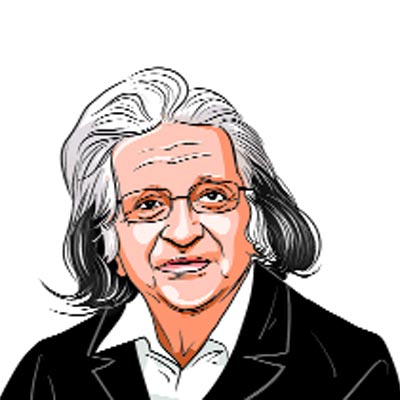Opinion How China can be held accountable
Upendra Baxi writes: China has escaped tough international censure over its human rights violations, including that of the Uyghur. But there is precedence in international jurisprudence that can make it see reason.
 Human rights defenders and groups throughout the world have consistently maintained that the continuing detention of an entire ethnic minority in camp-like and slave labour conditions cannot but be called a massive, ongoing, and flagrant violation of basic human rights. (Illustration by C R Sasikumar)
Human rights defenders and groups throughout the world have consistently maintained that the continuing detention of an entire ethnic minority in camp-like and slave labour conditions cannot but be called a massive, ongoing, and flagrant violation of basic human rights. (Illustration by C R Sasikumar) Around 10 million people, in the western region of Xinjiang in the People’s Republic of China (PRC), including those exposed to mass forced labour and living in internment camps, may never hear what the UN Office of the High Commissioner for Human Rights (OHCHR) said in its 48-page report. But they would agree that it is an understatement to say that “serious human rights violations have been committed” by the “government’s application of counter-terrorism and counter-‘extremism’ strategies”. They would also be familiar with the triumphant denial machine of the PRC which refuses to admit any human rights violations.
Of course, Dilxat Raxit of the World Uyghur Congress recently expressed the regret that the OHCHR did not “characterise these extreme atrocities in China as genocide” but his wishes have been fulfilled by the USA’s prompt condemnation of the “genocide”. However, this allegation is very difficult — almost impossible — to prove, as readers will know very well from the International Court of Justice’s verdict in the Bosnian Genocide case.
China will also deny other charges in the Uyghur matter, such as “ethnic cleansing” or even “racial discrimination” because it has always officially maintained that it is only engaged in anti-terror or counter-insurgency operations, as if such gross mass violations of human rights are permitted by international law. Human rights defenders and groups throughout the world have consistently maintained that the continuing detention of an entire ethnic minority in camp-like and slave labour conditions cannot but be called a massive, ongoing, and flagrant violation of basic human rights. To label this as “propaganda” is itself an act of State “counter-propaganda” — an act of a superpower hegemony which adds insult to injury.
In contrast to China’s official hyper-reaction, the OHCHR was excessively moderate. As she ended her term in office in August, United Nations High Commissioner for Human Rights, Michelle Bachelet, released a short report which merely said, “The extent of arbitrary and discriminatory detention of members of Uyghur and other predominantly Muslim groups… may constitute international crimes, in particular crimes against humanity,” and there were “credible indications of violations of reproductive rights through the coercive enforcement of family planning policies since 2017”. But she added that “a lack of government data” disabled the OHCHR from drawing “conclusions on the full extent of current enforcement of these policies and associated violations of reproductive rights”. She only recommended that “the Chinese government” should take “prompt steps to release all those detained in training centres, prisons or detention facilities”.
It bears reiteration that nowhere does the Report say that the PRC was guilty of committing “genocide” or even “ethnic cleansing”. It merely says that the PRC may have committed “crimes against humanity”. True, the PRC is not a member of the 2002 International Criminal Court treaty (the Rome Treaty) and has consistently maintained that customary international law goes against the ICC’s jurisdiction over crimes against humanity committed during peacetime because it requires a “nexus to armed conflict”, and “without such nexus, the major attributes of the crimes would be changed”. Yet it did not use its veto power to block the Council’s referrals of situations in Darfur or Libya to the ICC. Both China and Russia have also consistently blocked UN Security Council resolutions having the potential for punitive consequences for the Syrian government. As Sherine Tadros, Deputy Director of Advocacy and UN Representative, Amnesty International, has said, this “behaviour prevents justice and emboldens all parties to the conflict in Syria to act with indifference to international law” and that “when it comes to Syria, there are no red lines”.
Not all international law action is ruled out, though. A ray of hope emanates from the 2019 ICC pre-trial chamber ruling in the Myanmar-Bangladesh case concerning the Rohingyas which says the Court may exercise jurisdiction over crime “when part of the criminal conduct takes place on the territory of a State Party”. Not “all conduct should have occurred in the domestic territory (under Article 12(2) (A) of the Rome Treaty)”. According to Rodney Dixon, KC, who presented the Uyghur matter to the ICC, the “evidence shows that Chinese officials and operatives are coming onto Tajikistan territory, which is ICC territory, and targeting, arresting and deporting Uyghurs back into China”. He noted that the “crime is beginning on ICC territory and continuing into China”. The evidence shows this is being “orchestrated by Chinese officials” and that “officials from Tajikistan are informed of this and often directed by Chinese officials to take certain actions”. But the focus is on China and its officials who are “targeting Uyghurs abroad, especially on ICC territory”. Thus the relevant “Chinese officials” need to be “investigated by Prosecutor, ICC”, who may also investigate “what is happening in those countries, what Tajikistan and Kyrgyzstan officials are doing” and “what happens in China when Uyghurs are brought back” and go to camps” never to be “heard from again…”.
China’s ambassador to the United Nations, Zhang Jun, said that the “UN human rights chief should not interfere in China’s internal affairs” and further that the “so-called Xinjiang issue is a completely fabricated lie” which is aimed only at undermining “China’s stability and to obstruct China’s development.” One does not know whether the state practice of the PRC regards the normativity of human rights purely as an “internal matter”, with any earnest attention to the violation of core human rights of necessity seen as detracting from “stability” and “development”. Modern history provides abundant testimony otherwise. India’s demosprudence and jurisprudence certainly show how security and development are better served by following core human rights. China may still learn — for the larger future of the world.
The writer is professor of law emeritus, University of Warwick, and former vice-chancellor of Universities of South Gujarat and Delhi







